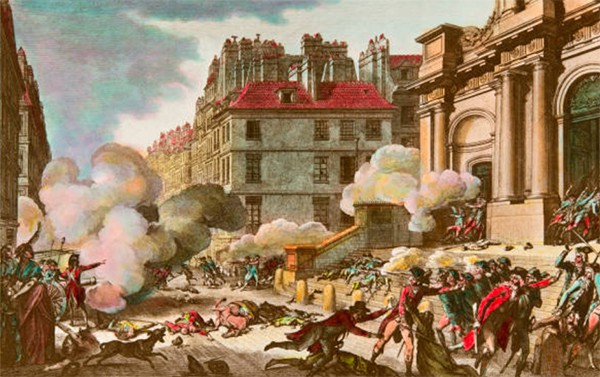Napoleon was a child of the Enlightenment, both through his education and his reading. In his youthful writings, he announced that he wanted to shake off all yokes and combat prejudices. His role-model at the time was Jean-Jacques Rousseau, and despite the fact that this philosopher would fall from his favour later, these deeply personal early writings resound with enthusiasm for Rousseau’s ideas. Astounded as he was, like many others, by the escalation of events in 1789, his first reaction was one of an officer of the King. He disapproved of the uprising and with his regiment participated in at least one ‘restoration of law and order’ operation. But he did in the end join the movement, because disorder in mainland France favoured the Corsican independence of which he dreamed: at that time, for him the French Revolution and freedom for his island were still linked. However, disappointed in that hope, he moved to the left, joining the Auxonne Jacobin club (February 1791), writing ardent republican think pieces and enthusiastically encouraging an idealised action on the part of the people. The proof of this exists in the some of the surviving texts he wrote. But his illusions were shattered, if not totally destroyed, when he witnessed, in June 1792, the almost bloodless invasion of the Tuileries and then, two months later, the attack on the Tuileries followed by the massacre of the Swiss guard. He would harbour all his life great scorn for what he (and others too) called the “populace” (“rabble”).
That being said, he had no difficulty in wearing a Revolutionary officer’s uniform. His associations, particularly that with Augustin Robespierre, Maximilien’s brother, ranked him amongst some of the most ardent Jacobins. It was at this period that he published the pamphlet, Le Souper de Beaucaire, [The Supper in Beaucaire], an imaginary conversation between several figures in the town of Beaucaire, in which the young officer plays the role of defender of opinions dominant in those days in Paris. It almost cost him dearly, when the Incorruptible (Maximilien Roberspierre) fell. During the purges that followed the Days of Thermidor, he was held under house arrest from 11 to 20 August 1794. In the end, no charges were held against him, and he returned to his work on the Army of Italy, but the offices of the War Ministry made attempts to hamper the career of this ex-“fellow traveller” of the terrorists.
And he remained “on the left”, when in the autumn of 1795, Royalist and reactionaries threatened the government. Having been put on non-activity, again because of his political past, he was kicking his heels in Paris. With an uprising brewing, the moribund Convention (the constitution of the Directory was about to be enacted) put its trust in the hands of Paul de Barras, general in chief of the Army of the Interior. He then set about re-employing generals on half pay, usually those who had been sidelined for Jacobinism. Bonaparte was one of them. Thanks to his cannon, mounted right in the city centre, which fired grape shot at the rioters on the steps and around the church of Saint-Roch, he helped to save the Republic, on 13 Vendémiaire, An IV (5 October 1795).
Later on, having been sent to Italy, he contributed to the putting down of Royalist attempts made on the back the victory of ‘reactionaries’ at the elections. This time, he fired no grape shot, merely sending general Augereau to Paris who took command of troops faithful to the Directory. This is what is known as the “Fructidor” affair or coup (4 September 1797). In Italy, though he had a great deal of freedom to act as he saw fit, he showed no reticence in following government guidelines, overthrowing some old monarchies, confiscating the property of some of the most recalcitrant of counter-revolutionaries. Later in Egypt, he did the same and in this could be regarded as the envoy of the Enlightenment in the Orient.
It is clear that Napoleon was well and truly a soldier of the Revolution. And when, as a soldier, he became mixed up in politics, Revolutionary governments could have had no complaints for his actions.


